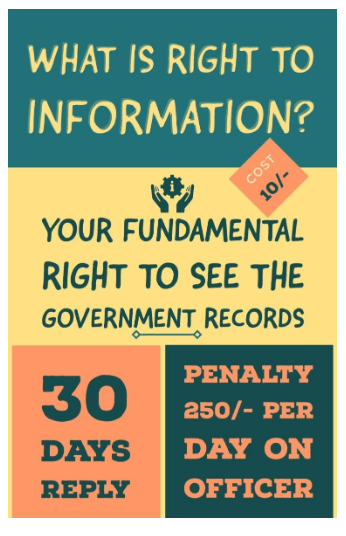UPSC Articles
POLITY
TOPIC: General Studies 2:
- Important aspects of governance, transparency and accountability, e governance- applications, models, successes, limitations, and potential; citizens charters, transparency & accountability and institutional and other measures.
Right to information: ‘Abuse’ of RTI

Daily Current Affairs IAS | UPSC Prelims and Mains Exam – 19th December 2019
Context:
- Chief Justice of India said the unbridled use of the Right to Information (RTI) Act had created a sense of “paralysis and fear” in the government.
- Paralysis and fear about this Act (RTI). People are not taking decisions
- CJI said time had come to lay down guidelines on the use of the RTI. Guidelines should be put in place to check the locus of the RTI applicant and put a “filter” on the kind of requests made under the 2005 Act.
| Justice Bobde said :
The court was not against the exercise of the right to information. “But it cannot be an unrivalled right. There is the serious problem of people filing RTI requests with malafide intentions, people set up by rivals,” he said. The RTI Act had become a source of criminal intimidation by people with an axe to grind. “Criminal intimidation is a nice word for ‘blackmail’,” Justice Bobde said. |
Genesis of RTI:
- 1975, in State of Uttar Pradesh vs Raj Narain “The people of this country have a right to know every public act, everything that is done in a public way by their public functionaries. They are entitled to know the particulars of every public transaction in all its bearing. Their right to know, which is derived from the concept of freedom of speech, though not absolute, is a factor which should make one wary when secrecy is claimed for transactions which can at any rate have no repercussion on public security.”
- It observed, “Voters’ (little man-citizens’) right to know antecedents including criminal past of his candidate contesting election for MP or MLA is much more fundamental and basic for survival of democracy.
RTI Act
- An applicant making request for information shall not be required to give any reason for requesting the information or any other personal details except those that may be necessary for contacting him.
- “The information which cannot be denied to the Parliament or a State Legislature shall not be denied to any person ”Bhagat Singh vs CIC in 2007, then Delhi High Court Justice Ravindra Bhat (now a Supreme Court judge) observed: “Access to information, under Section 3 of the Act, is the rule and exemptions under Section 8, the exception.
- Section 8 being a restriction on this fundamental right, must therefore be strictly construed. It should not be interpreted in manner as to shadow the very right itself.”
SC Judgements:
Jayantilal N Mistry vs Reserve Bank of India
|
DAV College Trust and Managin vs Director of Public Instructions
|
Central Board of Secondary Education (CBSE) & Anr vs Aditya Bandhopadhyay and Others in 2011
SC : “The nation does not want a scenario where 75% of the staff of public authorities spends 75% of their time in collecting and furnishing information to applicants instead of discharging their regular duties” |
Girish Ramchandra Deshpande vs Central Information Commission & Ors in October 2012
|
Conclusion:
- A Transparency Audit report submitted to the Central Information Commission (CIC) in November 2018 sought feedback from 2,092 PAs under the CIC to evaluate implementation of Section 4 of the Act. Only 838 (40%) responded and even here, 35% of the PAs fared poorly with little transparency in parameters such as organisation and functions, budget and programme, e-governance, and other information disclosures.
- The other key misgiving with RTI implementation has been the persisting problem of vacancies in the CIC and State commissions — the CIC has four vacancies and 33,000 pending cases. After the top court’s directions, this lacuna should be addressed by governments quickly.











